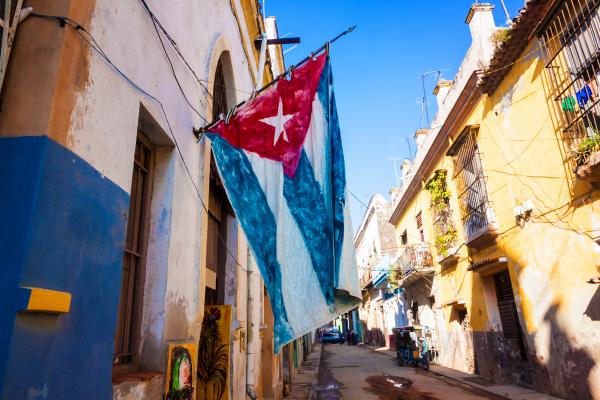THOUGH SOME HAVE accepted “axis of evil” characterizations of Cuba and North Korea, my experiences of the two countries—nine visits to Cuba and one week in North Korea—have led me to far different conclusions: There are very few similarities between the two nations, and neither is inherently “evil.”
Music infuses the air in Cuba as in no other of the 60 countries to which I’ve traveled. The streets are alive. Children play baseball and soccer in the streets. Cafes, parks, and other public places are crowded and noisy. Nearly everyone I’ve met has treated me like a long-lost friend, even more so when they learn I’m American. There is a natural affinity between Cubans and Americans. More than 100 flights a week ferry people between Havana and Miami.
In North Korea, the streets are eerily quiet. There is virtually no visible human interaction. North Koreans are forbidden to make eye contact with Westerners. There appear to be no public gathering places except the massive government plazas where military parades and government rallies are staged. I was never allowed to go anywhere without a “minder.” I traveled with a Presbyterian Church (U.S.A.) official who was born in North Korea and returns there frequently. His counsel: “Assume that everywhere you go you are followed and that every conversation you have, no matter where, is bugged.” His relatives received permission to travel from their home village to Pyongyang to visit him. In our hotel room, he turned the television volume up to full blast before they began talking quietly. On one early morning walk near our hotel (the only time I was unescorted), I took a few photographs. By the time I returned to the hotel, government representatives were waiting in the lobby, demanding to see all my photos and instructing me on which ones to delete.
Over the course of nine visits to Cuba, I have had open conversations with everyone from high-ranking government officials to cab drivers and farmers. I have never sensed any hesitation on anyone’s part to express their political views. I have heard as many criticisms of the Cuban government and policies as of the U.S. embargo. I have also heard the aspirations of countless Cubans. Though organized public dissent is severely restricted, one thing is certain: I have not spoken to a single Cuban who wants to return to the pre-revolution system of unbridled capitalism, corruption, and U.S. domination.
In North Korea, I experienced no exchange of ideas about anything. All conversations were monotonously rote: “The U.S. is openly and totally hostile to North Korea and South Korea is an illegitimate U.S. proxy.” Some of this, of course, can be explained by the fact that North Korea is still technically at war with the two countries—the Korean War ended in 1953 with an armistice, but not a peace treaty. That reality completely colors the official North Korean posture, a posture that is universally expressed, if not shared, throughout North Korea. North Korea is utterly isolated, by its own choice.
The church in Cuba has grown rapidly since religious leaders reached a rapprochement with the government in the early 1990s. Presbyterians, Anglicans, Baptists, and Pentecostals make up about 10 percent of the island’s population, which is overwhelmingly Catholic. There are also Orthodox and Jewish communities in Cuba. Religious education, youth ministry, and diaconal work are exploding. Ecumenical life is rich. Several Christian leaders serve in the Cuban parliament. The minister of religions, Caridad Diego Bello, is a trusted advocate for the church in Cuba.
The sole expression of organized religion in North Korea is the Korean Christian Federation (KCF), a government-controlled body that exerts complete authority over all religious activity in the country. Two congregations are allowed to meet for Sunday worship, both in Pyongyang, but children are not allowed to participate and instead attend government-run “educational classes.” House churches are allowed under the auspices of the KCF—I attended one and worship seemed far more authentic than in the two formal houses of worship.
Americans tend to equate “freedom” with “democracy.” But in my travels for the Presbyterian News Service, I have witnessed far more nuanced distinctions. Cuba, like many other countries, has considerable freedom without U.S.-style democracy. North Korea has neither.

Got something to say about what you're reading? We value your feedback!
